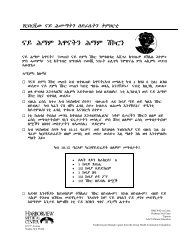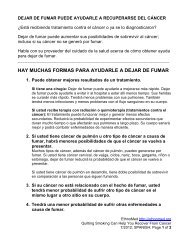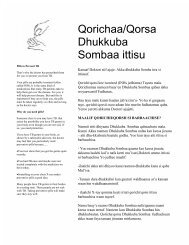Somali Knowledge Attitude Practices Study (KAPS) - EthnoMed
Somali Knowledge Attitude Practices Study (KAPS) - EthnoMed
Somali Knowledge Attitude Practices Study (KAPS) - EthnoMed
Create successful ePaper yourself
Turn your PDF publications into a flip-book with our unique Google optimized e-Paper software.
The two key informants working with INGOs affirmed the reasons cited by the community<br />
respondents. They also noted that a mother’s attitude towards breastfeeding may be the same or<br />
may differ from that of her social network members. The belief that the breast has no milk is a<br />
key factor in delayed initiation of breastfeeding. They attributed the origin of the belief and hence<br />
the consequential practice to culture and lack of knowledge. The practice of delaying initiating<br />
breastfeeding is sustained by continued belief that the breast has not milk, lack of appropriately<br />
competent TBAs and also lack of health education.<br />
Since the two differed in their view on whether the practice existed before the conflict with one<br />
affirming that it did while the other claimed it did not, the conclusion is that it probably existed<br />
but has become more widespread during the conflict era.<br />
The two respondents were requested to suggest practical ways that can be effectively applied to<br />
make mothers breastfeed immediately. They both proposed training and building capacities of<br />
TBAs and caregivers and creation of awareness on breastfeeding to the community in general.<br />
Although a mother decides on the appropriate age to introduce complementary feeding, other<br />
caregivers influence the decision making process. The age of the child and knowledge are major<br />
influencing factors on when to start while nutritional quality of foods, availability and<br />
affordability of foods influence what is given as complementary.<br />
Mothers stop breastfeeding when they become pregnant due to the belief that the milk of a<br />
pregnant mother causes diarrhoea to the one being breastfed. The other reason is illness, when<br />
such a mother becomes sick or feels weak (anaemic) it is attributed to breastfeeding while<br />
pregnant.<br />
The networks that mould breastfeeding include, fathers (husbands) who are seen as people who<br />
assert pressure on mothers. This can be direst or indirect, e.g., when a mother is apprehensive of<br />
breastfeeding for fear that the breast will sag and result in reduced or loss of her husband’s<br />
interest in her. They can either encourage or discourage a mother. Other key persons are<br />
grandparents of the child. The others, relatives and neighbours among others are less influential.<br />
In response to the question whether there are specific community members who need to be<br />
convinced first for change in child feeding practices to occur, the answer was in the affirmative<br />
and both listed husbands/fathers of the children and service providers (TBAs, midwives and other<br />
health workers) change agents.<br />
Two nutritional strengths of <strong>Somali</strong> complementary diets are that it is considered to be nutritious<br />
(in which availability of powder milk was accredited) and the practice of continued breastfeeding.<br />
On the flip side, offering of water with sugar and tea and the general inappropriate<br />
complementary feeding were cited as weaknesses. It was noted that some caregivers do not<br />
observe hygienic practices and feeding of unboiled milk was cited as one example.<br />
In expounding further the issue of inappropriate complementary feeding, food availability, lack of<br />
knowledge on balanced diets and health and lack safe water for domestic use, including drinking<br />
were cited as key factors that influence the quality of children’s diet between the age of four and<br />
59 months. The key players in determining the quality are mothers and fathers and other<br />
caregivers in general.<br />
41






